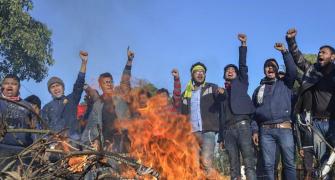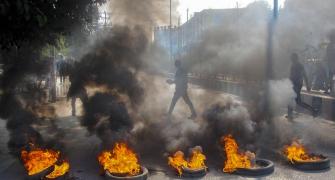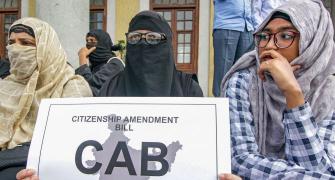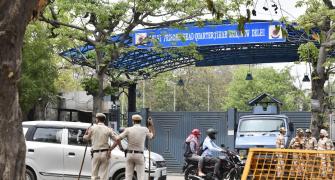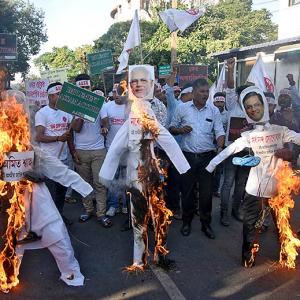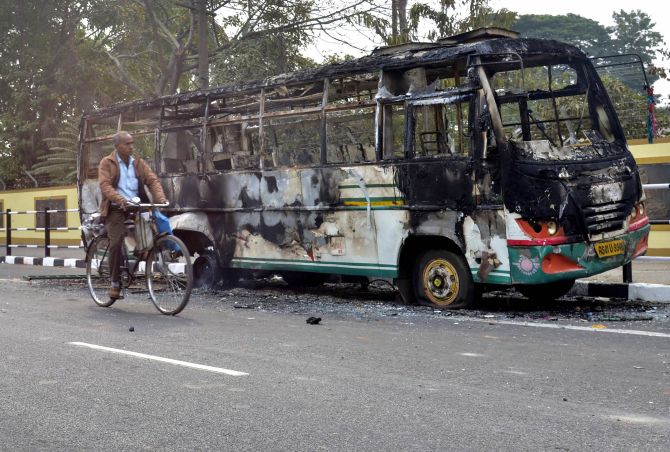'The people are very open in their speeches about the actions of the BJP which is seen as a betrayal.'
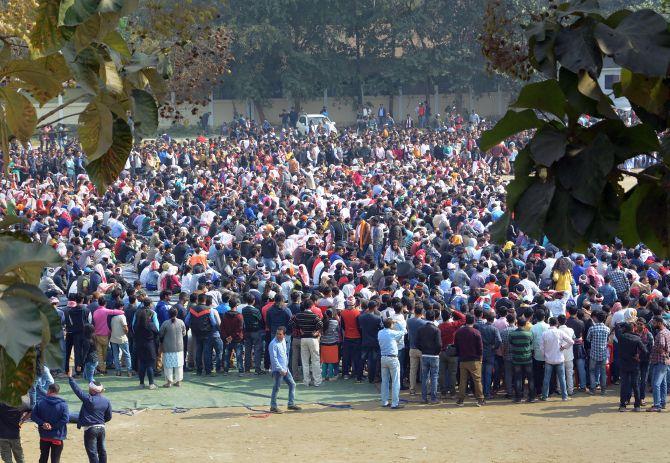
"If there are provocations and people try to exploit and manipulate the situation along linguistic, religious lines, then Assam might relapse into its troubled past," Dr Kaustubh Kumar Deka, assistant professor of political science at Dibrugarh University, tells Rediff.com's Archana Masih.
Three people have died in clashes with the police, curfew has been imposed, the Internet has been shut down. What is the situation on the ground in Dibrugarh?
It was a cat and mouse game between the youth protestors and the police.
People were putting up barricades and setting off fires to block the passage of security forces. The road to the CM's house in Dibrugarh was blocked. The protestors damaged some of the barricades.
Spontaneous small rallies were taken out in neighbourhoods.
This (Friday) morning, curfew was relaxed for three hours and everybody rushed to the market. Provisions are limited and running out so people are stocking up.
There were huge lines outside ATMs. They have also run out of money because there was a bandh for a couple of days before the curfew was imposed.
The police had to control the crowds at the huge lines at petrol pumps. Internet was banned for 24 hours, but now they say indefinitely (the interview was conducted on Friday afternoon).
How long do you think the protests will continue?
From holding rallies they are moving towards hunger strikes. Especially in Guwahati and Dibrugarh, students are taking the lead and organising hunger strikes. They are joined by writers and artists.
Since the army has been called and there is a heavy presence of security forces, I think the intensity of protests will reduce in a couple of days.
The protests was building up while the Bill was in Parliament. Now that the Bill has been passed, the real outburst is yet to come out.
In Guwahati, people defied the curfew and took to the streets, but other towns are slowly picking up now.
My guess is it will continue for sometime though the intensity will be reduced. The vandalism and damage to public property will end.
There are appeals being made for maintaining calm so that the security forces can be withdrawn.
Who are the faces of these protests? Assam has a history of student/youth activism fighting for its rights -- what makes the Assamese student movements different from the rest of India?
It goes back to anti-colonial movements. In fact, student associations in Assam are older than the Congress.
From the beginning students have been almost like the spokespersons of different groups. Different organisations have partnered with student groups.
Historically, they have assumed the role of taking the lead in voicing social issues. They had have a non-partisan kind of image because of which people identified with them more than a specific political party.
This is what gave them legitimacy and credibility that they were representing the popular voice at large, not necessarily any political party.
Although the AGP (the Asom Gana Parishad, currently a constitutent of the National Democratic Alliance which rules India and Assam) was an offshoot of the Assam movement, it is now seen as a party that has completely betrayed the people of Assam.
They are facing a lot of anger. Their party offices have been burnt.
Similarly for the CAB (the Citizenship Amendment Bill, now the Citizenship Amendment Act), it is the student organisations that are at the forefront.
Not only the All Assam Students Union, but also other student organisations, including other young students under the banner of their own universities and colleges.
Residents of nearby areas are joining these groups.
Some believe the protests are politically motivated.
Apart from students, there is a very active group of artists under the Artists of Assam banner -- popular singers, actors, intellectuals -- senior citizens and apolitical people.
Unlike the Assam movement, which was completely led and directed under AASU, this is a broad-based movement where students are the core strength, but they have been joined by other members of society.
They may not represent any party, but their slogans also show that they want it to go to the upcoming elections and remember what the BJP (the Bharatiya Janata Party) has done.
The people are very open in their speeches about the actions of the BJP which is seen as a betrayal.
Across the state there were attacks on the houses of MPs/MLAs. Several local BJP leaders, especially ABVP (the Akhil Bharatiya Vidyarthi Parishad, the BJP's student wing) members have resigned en mass.
None of the north eastern political parties voted against the Bill. The BJP has achieved considerable success in the region in the past couple of years. How will this play out in the politics of the region?
That is why the sense of betrayal is felt all the more. It was through Assam that the BJP has spread out to other parts of the north east.
Assam has the largest BJP presence in terms of seats. The foundation on which they came (to power) was based on their political rhetoric of land, culture and language.
People are feeling all the more let down because other states of the north east have been given some protection like Inner Line Permits and the Sixth Schedule, but the Brahmaputra valley and some parts of Tripura were left exposed.
Assam has seen peace for nearly three-and-a-half decades, what faultlines is the Citizenship Amendment Act likely to reopen?
I am hopeful that the mistakes of the past will not be repeated. So far, people have been conscious to not take any communal line to attack or vilify any other community and just focus on the problems of the Bill.
But those explosive possibilities are always there. It is like sitting on a powder keg.
If there are provocations and people try to exploit and manipulate the situation along linguistic, religious lines, then Assam might relapse into that troubled past.
So far, people are very conscious about that past and the identity of the Assamese regardless of religion, region, language or ethnicity is being emphasised.
The common sentiment is that people are putting up a unified front to the CAA.
What is the fear of the Assamese people?
There has always been a history of linguistic anxiety. There have been instances when the Assamese language has been minoritised.
In British times, Bengali was made the official language and it took many movements for the Assamese language to get the status of official language.
Linguistic censuses over the decades show that the number of Bengali speakers is on the rise. These factors are always playing on the mind.
There is the issue of both Muslim and Hindu migration. The feeling is that Assam has already taken people till 1971 and it has changed the demography.
Assam shares the longest border with Bangladesh and people feel if they accept more migrants their culture will become a minority culture. It is about culture and also about resources.
What can the government do now?
It can do what it has done for other parts of the north east and exempt Assam from the CAA under different clauses. There has been an announcement by (Home Minister) Amit (Anilchandra) Shah of implementing clause 6 of the Assam Accord, which is about giving special protection to the indigenous people of Assam.
That might be reservation of seats in the assembly or a special land policy, but the problem is that people say this could have been done before tabling the Bill.
Clause 6 has been discussed by previous governments also. The two areas of Assam that come under the Sixth Schedule are also opposing the CAA because the feeling is that outsiders can always filter through and buy land.
The government should come out with a concrete announcement about safeguards. Previous governments also had commissions and nothing has been achieved so people don't have trust.
Archana Masih has covered national affairs for Rediff.com for 23 years.
She can be reached at archana_masih@rediffmail.com

